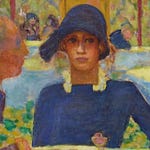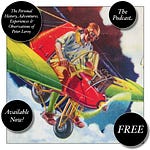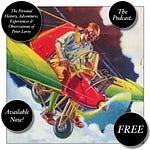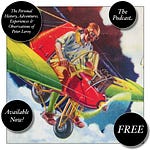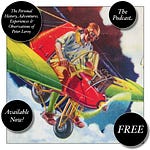32
GRANDFATHER WALKED ALONG, toward home, through the rain. As he walked, he began to think his way through Ariane’s idea. He tried it out. He imagined himself putting it into effect, standing at the window of the bedroom, while he and Grandmother slid down the Bolotomy River on their way to Rarotonga. He imagined its effect on her, and he saw her eyes brighten, felt the weight of hopelessness begin to lift from her, and from himself. When he saw a smile begin to appear around the corners of her mouth, he decided that it was exactly the right thing to do.
(And just then the rain should have stopped, and the clouds should have begun to break up, to drift apart into fluffy tufts, just drifting lazily along in front of the moon, because his step was lighter now, and he should have had moonlight to light his way, to see him home.)
Ariane, following along a decent distance behind him, unseen, unheard, marveled at the lightness in his step and the way that he seemed to stand taller and the way he began to hurry.
He was amazed himself at the way hope, that captivating narcotic, had enlivened him, and he was pleased with himself for bringing the opiate of hope to his light o’ love, his everything, his Eleanor. He felt like the bringer of life, full of life himself, with life to spare.
(So there must have been a moon.)
He didn’t let himself into the house quietly, as he would ordinarily have done. To step softly now felt like a mistake, like giving in to her disease, like giving up. None of that! He burst into the house, humming “Rarotonga.” He knew that he was a little drunk, but it didn’t seem to matter. This wasn’t the soul-deadening, painkilling kind of drunkenness he had spent so many nights trying—and failing—to achieve. This was the bubbly tipsiness of a guy out on the town, a happy fella.
“Eleanor!” he called out.
He pressed the button for the doorbell, just because he hadn’t heard it in so long. He had wrapped the clapper with strips of cloth, so it didn’t ring, but it thumped like a rapid heartbeat, and he put his hands over his heart and sang out, “Eleanor!” as if he thought he had an audience, or as if he knew he had an audience. On the street, in the shadow of the neighbors’ hedge, Ariane stood watching and held her hand over her mouth to muffle her giggle.
Grandfather bounded up the stairs and peeked around the corner of the bedroom door, hanging on to the doorjamb like a young man in a musical. Grandmother was awake.
“Eleanor, my sweet darling,” he said.
Grandmother thought she saw a man at the end of his rope, and it saddened her, not simply because he’d come to the end of his rope, but also because she felt that she was to blame for this sorry state he was in, and she was annoyed with herself for being the cause of the misery that had brought him to it. She loved him. She wanted him to be at ease in his life. She wanted to be the best thing in it, and it made her miserable to think that she might have become one of the worst things in it.
Grandfather began to sing to her the silly lyric of that silly song, crooning the opening lines as if they were the beginning of a prayer: “Come on, honey, come with me. Sail away, across the sea—”
She smiled.
“To Rarotonga, where the nights are longa, and our love will grow much stronga.”
Her smile was only the shell of a smile. It was the same hollow smile she used whenever Grandfather told her that she looked better, stronger.
“Oh, honey, won’t you come alonga, across the sea—”
He recognized that hollow smile and saw that she was indulging him in his wishful thinking, and he realized that he had a long way to go to get her to go along with him.
“—to Rarotonga with me?”
She brought her hands together on the blanket in something like applause.
For a moment, invention failed him. He had gone as far as he’d planned. He didn’t know what came next.
“The tide is full,” he said, tentatively.
“Mm,” said Grandmother, but merely acknowledging him, not going along with him.
“The rain has stopped—and there’s a moon.”
He walked to the window. He looked out. Under the streetlight he saw Ariane. She was standing, a little unsteadily, directly under it, looking up. She saw him come to the window (she must have seen him), and she leaned against the lamp pole and stood there looking up. She smiled at him, and she clasped her hands together and held them against her chest, and he understood that she was encouraging him, wishing him luck.
“It’s the perfect night,” he said. He took a breath. “The perfect night for shipping out.”
“It would be,” said Grandmother.
“Not would be,” he said, still turned away from her. “It is. It is the perfect night.”
Grandmother said nothing. He was emboldened.
“Everything’s aboard,” he said. He was disappointed to hear a pleading tone in his voice. He hoped she wouldn’t notice it. “We’re as ready as we’ll ever be.”
There was no objection.
“I say we go with the tide,” he offered.
“Well,” said Grandmother, “I—”
He rushed to her side. He knelt beside the bed and held her. “We’ve been talking about it for so long,” he said. “I’ll bet you thought we’d never go. And you know, I think that if we just went on talking about it, maybe we never would go. But—now—tonight—we can—if you want to.”
Now she knew that she’d been wrong about his state of mind. The goofy smile she saw was real.
“You’d better cast off, then,” she said.
“That’s right!” he said. “I will. Cast off. I’ll just—go on deck—and you stay here—below—and—”
The light. The light was wrong. The streetlight overwhelmed the moonlight.
“Watch the light,” he said. “The lights—the lights on shore.” He had an idea. He was getting carried away. It was just what the moment required. “Watch them sweep by.” He waved his hand at the swath of street-lamp light. “And you’ll know that we’re on our way down the creek, heading out into the bay.”
Down the stairs. Out the door. In a moment, a passerby, if there had been a passerby, would have seen an elderly gent, spry and tipsy, atop the street-lamp pole, stretching himself out along the length of the arm that held the light, holding a satin jacket, borrowed from a dark-haired girl at the base of the pole. The girl was supposed to be keeping an eye out for the cops, but she was watching the man on the pole instead. He passed her jacket over and around the light in slow circles, making bands of light and shadow pass across the window of the large gray house across the way. Then he wrapped the jacket around the light completely, unscrewed the hot bulb and dropped it, inside the jacket, to the girl, who caught it and took a bow, as if she had an audience.
A few minutes later, Grandfather was back in the house, undressing quietly in the bedroom, where Grandmother seemed to be asleep. Ariane was making her way from door to door around my grandparents’ neighborhood, explaining to the startled neighbors that the street light had been extinguished “at Mr. Leroy’s request,” because it kept Eleanor awake.
“She’s very sick, you know,” said Ariane, and the neighbors kept their eyes down and mumbled that they knew.
[to be continued]
Have you missed an episode or two or several?
You can begin reading at the beginning or you can catch up by visiting the archive or consulting the index to the Topical Guide. The Substack serialization of Little Follies begins here; Herb ’n’ Lorna begins here; Reservations Recommended begins here; Where Do You Stop? begins here; What a Piece of Work I Am begins here.
You can listen to the episodes on the Personal History podcast. Begin at the beginning or scroll through the episodes to find what you’ve missed. The Substack podcast reading of Little Follies begins here; Herb ’n’ Lorna begins here; Reservations Recommended begins here; Where Do You Stop? begins here; What a Piece of Work I Am begins here.
You can listen to “My Mother Takes a Tumble” and “Do Clams Bite?” complete and uninterrupted as audiobooks through YouTube.
You can ensure that you never miss a future issue by getting a free subscription. (You can help support the work by choosing a paid subscription instead.)
At Apple Books you can download free eBooks of Little Follies, Herb ’n’ Lorna, Reservations Recommended, and Where Do You Stop?
You’ll find overviews of the entire work in An Introduction to The Personal History, Adventures, Experiences & Observations of Peter Leroy (a pdf document), The Origin Story (here on substack), Between the Lines (a video, here on Substack), and at Encyclopedia.com.




